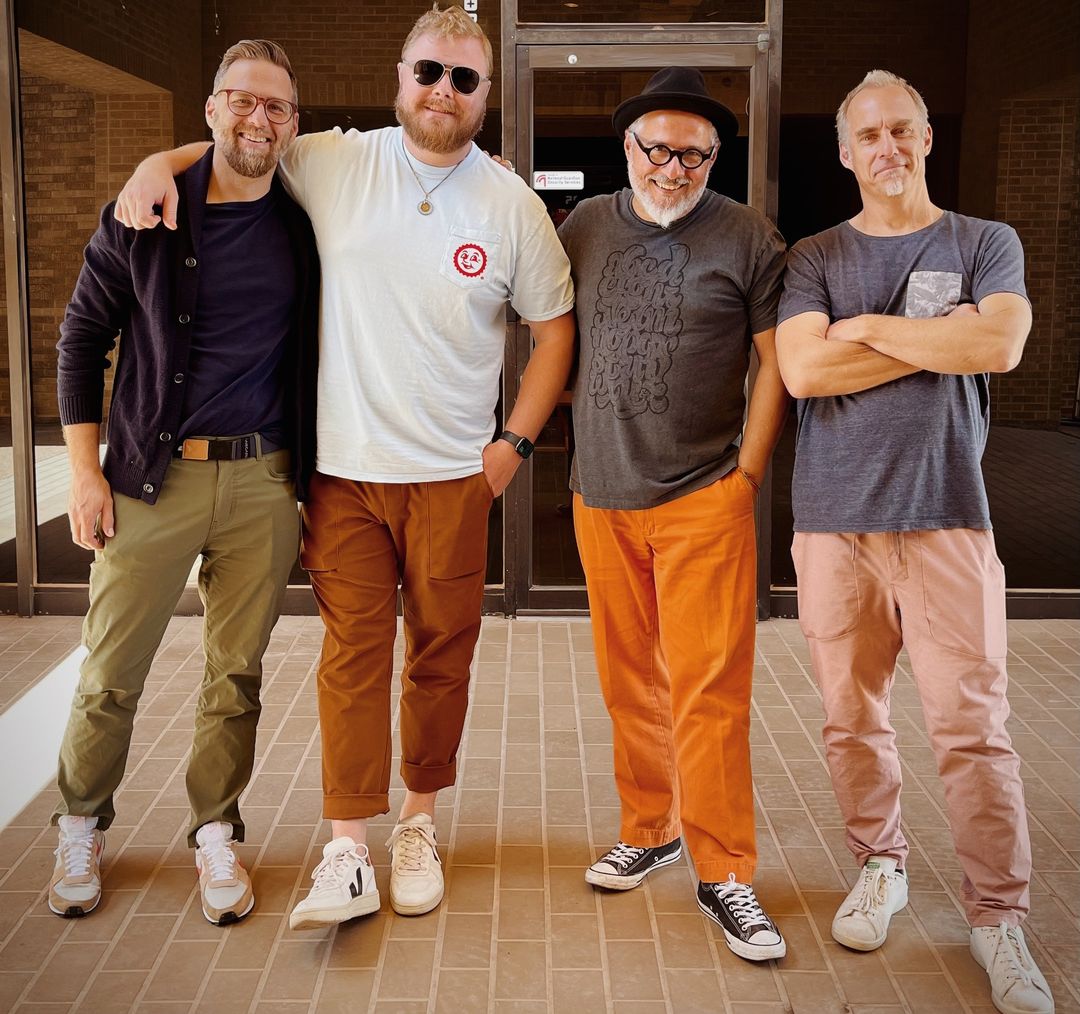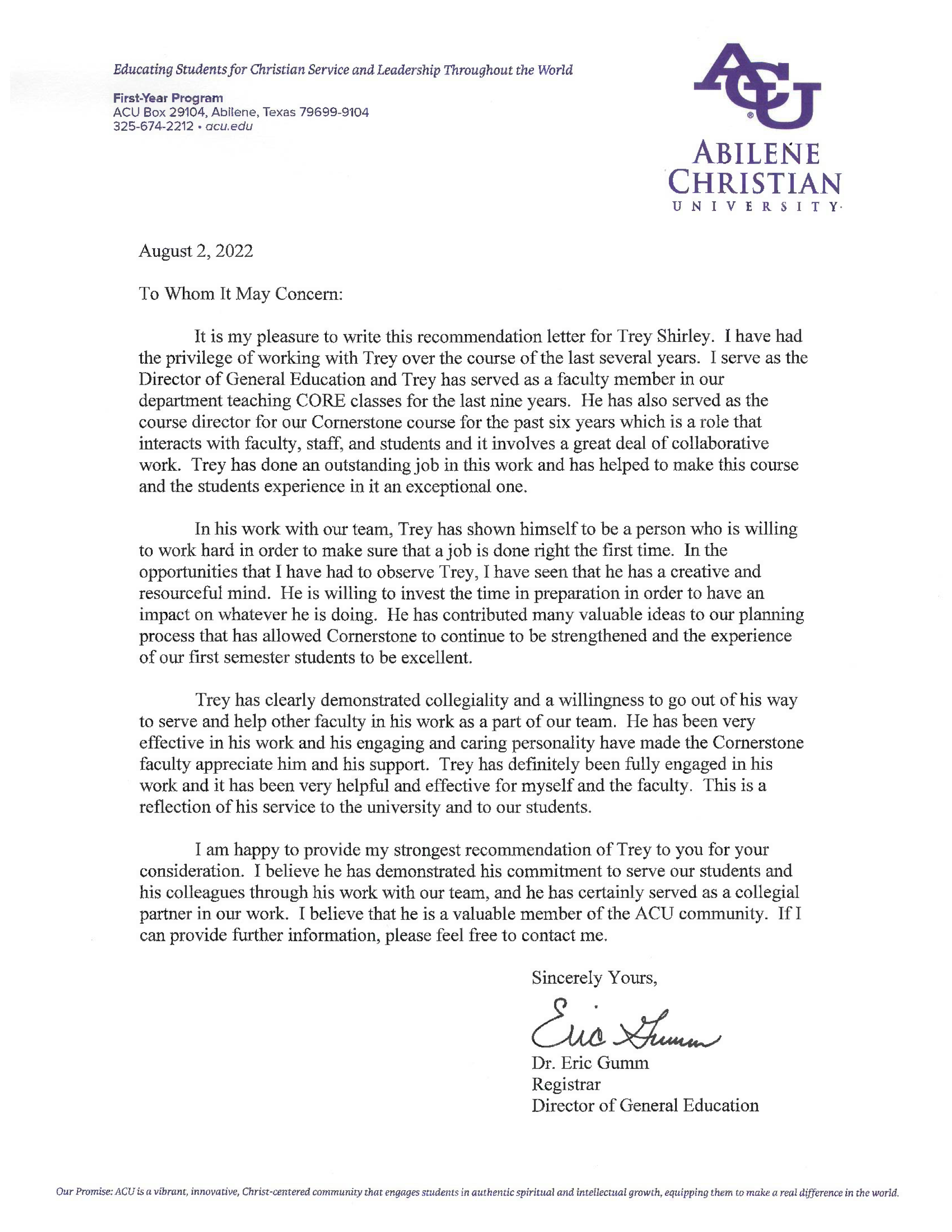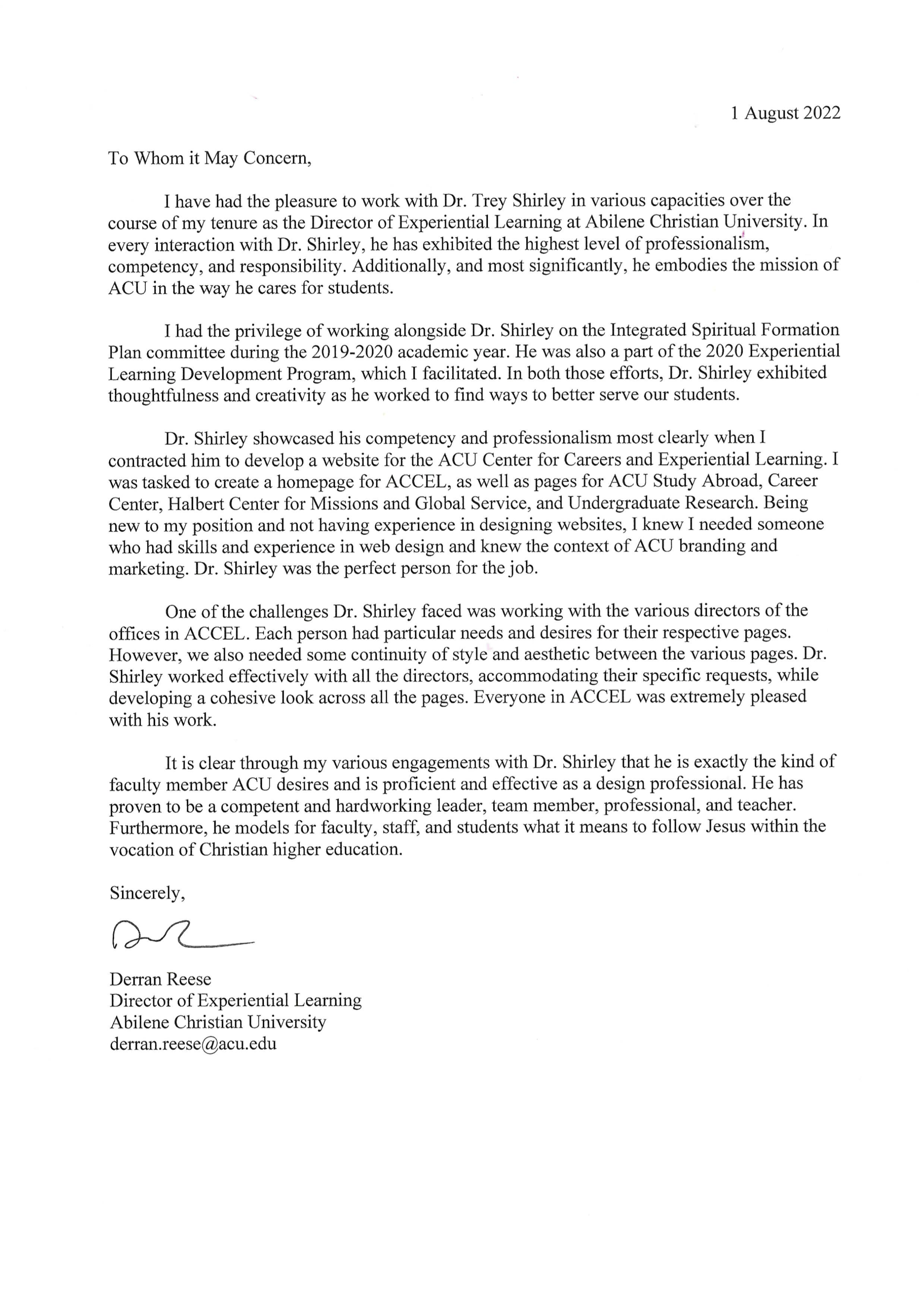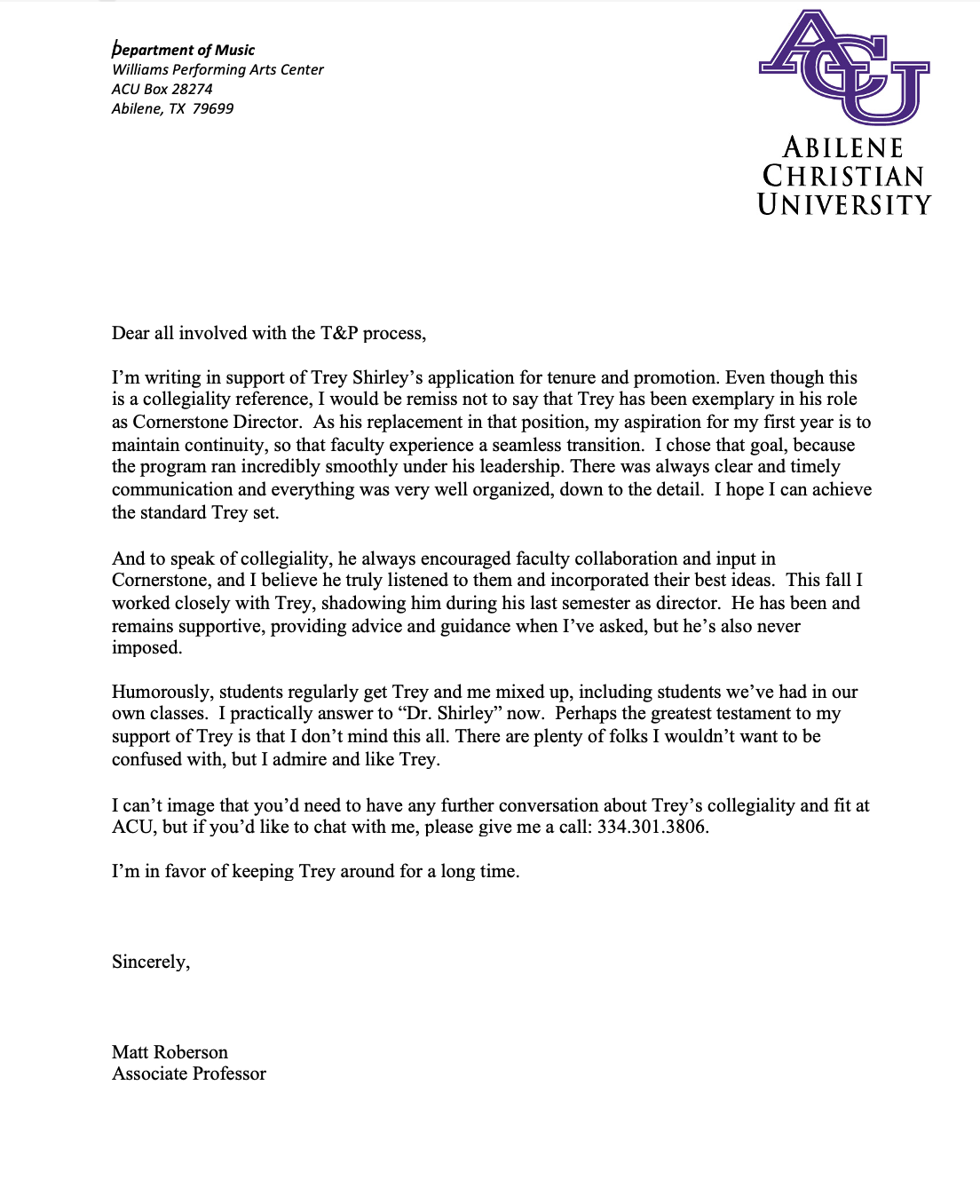University Requirements
According to ACU’s Tenure & Promotion Guidelines,
“A consideration of collegiality is particularly appropriate at a Christian university and is given special attention when tenure is under consideration. Collegiality involves relationships within departments/schools, within colleges, and within the university. These interactions should support the mission and goals at each level of the institution.”
(In addition to the minimum requirements for tenure provided in “Guidelines and Procedures,” the department adds the following) The portfolio and the letter from the department chair and the committee should address the collegiality of the applicant.
Types of Collegiality Interactions
- Sharing personal values and beliefs with other colleagues
- Being willing and open to new ideas
- Being considerate, sensitive, and caring of others
- Demonstrating tolerance for opposing opinions of colleagues
- Volunteering to help other colleagues with common academic tasks
- Participating in discussions about academic issues
- Participating in academic decision processes
- Fostering a sense of community and equality
- Demonstrating interest and cooperation across disciplines
COLLEGIALITY REFLECTION
God uses many means to reveal God’s self to us, but the place where I meet the Divine most frequently is in community with others.
Family
At the heart of my personal community is my family and I frequently see God here. My wife has been the most influential in this respect as she inspires goodness within me and has shown me the beauty and redemption that comes through deep companionship with another believer. I see God in her on a daily basis, whether it is through the way she cares for her patients or our children; her servant-minded heart reveals the gospel to the world in seemingly mundane, yet essential, acts of service and love. My daughters and son have taught me the love of a parent and I see the love of God in this. Most of my time outside of work is spent caring for my children. I believe this important work is at the heart of God’s vision for community and I fully embrace my important calling as a dad to my three children: Beth, Sarah, and John.
Church
In my church and small group, at Highland Church of Christ, I have witnessed God’s work and His grace in many ways. I participate as a member and small group leader at Highland and it is through this group of believers that I am most consistently and repeatedly reminded of my salvation and my calling. God is also revealed to me through the teaching and community of my Sunday school class, Sojourners, where I am also drawn deeper into community with my peers. Through our small group, we are constantly engaged in service activities around our local community. We regularly take offerings through our “beans and rice” suppers, where we eat beans and rice and donate what we would have otherwise spent on a meal to local causes. One of the causes that has grown out of these offerings is a local community service project where members of our group visit the homes of local shut-ins and single mothers and help with basic handyman services. One extended project we worked on was the refurbishment of a home at 1841 Cedar Creek, which took over six months. Through these projects and this community’s willingness to sacrifice and share, I have seen God’s vision for community in many rich and powerful ways.
Confirmation of Membership: Screenshot of Realm Online Directory Profile
Students
My students are another community that richly blesses me spiritually on a daily basis and reveals the love of God to me. In my students, I see God reflected in myriad ways. In the diversity of this community, I often see people in many different stages of life; brokenness, healing, excitement, and anxiety may all be seen simultaneously, sometimes all sitting at the same table. Yet, despite all that they are going through, I am constantly encouraged by my students’ passion for community, readiness to take on leadership roles, willingness to sacrifice for others, and commitment to service.
Within the classroom, I strive to create a community that is, first and foremost, safe, where students know that they are cared for and loved. As an art instructor, I know that students who do not feel safe will not be willing to make themselves vulnerable in the ways that are required in making great art. But, this principle applies in more than just the art classroom. Forming strong community bonds is central to student success. Many of my favorite moments come in the classroom, seeing my students take leaps of courage and digging deep within themselves to achieve new depths of learning.
As wonderful as the classroom setting is, many of my most meaningful interactions with students occurred outside of the classroom. Whether it is in welcoming students into my home or meeting with someone in my office over a cup of coffee, these opportunities have become an essential part of my teaching. In fact, when I think of the moments in teaching that have been most impactful for me as a teacher, most of them happened in a setting where my role of teacher was blurred with my role as counselor, confidant, or brother in Christ. I think of times such as those spent praying with a student who just received a cancer diagnosis or lost a brother, getting a call from a suicidal student late at night, gathering around a student whose health issues are preventing them from returning next semester, or eating lunch with a group of students on Sundays. These are experiences that are rarely planned, yet are an invaluable part of the teaching experience.

Coworkers
One of the reasons I love working at ACU is the rich community that surrounds me from faculty to support staff. It is truly the people at ACU that are the aspect of this job that I value the most.
Art + Design Faculty
Outside of teaching, it is an amazing pleasure to serve in the department of Art + Design. Through my roles as Assistant Chair and Interim Department Chair, I have had amazing opportunities to connect with each member of the department and build many lifetime friendships. Despite my other appointments, Art + Design will alway be my “home” at the university. It is my primary community at ACU, the crux of my professional identity as a faculty member, and my safe space. This is because of the people I work with, who have been incredibly supportive and encouraging during my toughest moments at ACU.
Co-Teaching
One of the most meaningful teaching experiences for me has come through the opportunity to co-teach over a dozen classes during my time here at ACU. I cannot think of a better experience for young faculty members than having the opportunity to be paired in the classroom with other teachers. Through my co-teaching experiences, I have learned classroom management skills, better teaching and planning strategies, information from fields far outside my own discipline, grading techniques, instructional technologies and so much more. But the most important thing that I have gleaned from this experience is great friendships with people that I might not otherwise have had the opportunity to work with so closely.
Cornerstone Direction
Taking on the mantle of Director of Cornerstone has probably required the most collaboration of anything with which I have been associated during my time at ACU. Through this role, I regularly work with a dozen spotlight speakers, more than thirty instructors, designers in the Learning Studio, workers in facilities, those within the First Year Program and Admissions, advisors, and administrators in the Office of Institutional Effectiveness and many more programs. I value these partnerships and have been richly blessed personally and professionally through regular meetings with those extended members of the Cornerstone team.
Cornerstone Advisory Council
Another experience that has been invaluable to me has been participation in the community of Cornerstone teachers, which I now have the blessing of directing. When I started at ACU, the idea of teaching Cornerstone was thrilling, yet also frightening. It had content that I was relatively comfortable with, yet the translation of that content into the classroom setting posed innumerable challenges. In my first year, I was able to pull together a group of other new Cornerstone teachers who met weekly to share lesson plans, review Spotlight presentations, and strategize on assignments. However, we soon realized that the situation largely felt like the blind leading the blind. To remedy this, we brought in a troop of more seasoned Cornerstone faculty who freely shared ideas and resources, and most importantly gave us moral support. From that point forward, I felt empowered and energized in a way that I had not experienced before. Today, I continue to meet with these other teachers on a weekly basis and they have created the bedrock of my professional and academic support.
Academic and Scholarly Collaboration
Collaboration at ACU is amazingly easy. Faculty share very diverse interests and are anxious to include others in their passions. The faculty member that I have worked the most closely with in pursuing academic and scholarly projects is Nil Santana. Dr. Santana and I first began working together in 2014, after recognizing a shared passion for Design Thinking. Over the next two years, we worked with many others at the university to try to create a broader context for discussions about Design Thinking take place, including: Stephen Johnson, John Weaver, Jason Morris, Kyle Dickson, Hope Martin, Darren Wilson, and many others. Through our collaborations, we developed an Honors Colloquium, entitled “Think Wrong,” which we co-taught together in the spring of 2016, and a large-scale design challenge that we led for Cornerstone in the fall of 2016. Out of those projects, I developed my own research project, “Integrating Art Educator Identities as Artist, Researcher, and Teacher through Design Thinking at the Christian University” and together we are still working on plans for a Center for Creative Inquiry at the university.
Conferences have been another place where I have had many opportunities to collaborate with faculty, not only from ACU, but from other institutions as well. For the past three years, I have participated in the Christian Scholars Conference and have presented on joint panels with scholars from Lubbock Christian University, Lipscomb University, Harding University, and Pepperdine University.
Welcome
Summary
Curriculum Vitae
Support Materials
I. Teaching
Reflection on Teaching Effectiveness
University Requirements
Departmental Requirements
II. Scholarship
Reflection on Scholarship
Scholarship Inventory
Scholarship Highlights
III. Service
University Requirements
Departmental Requirements
IV. Collegiality
Reflection on Collegiality
Significant Partnerships and Collaborations



